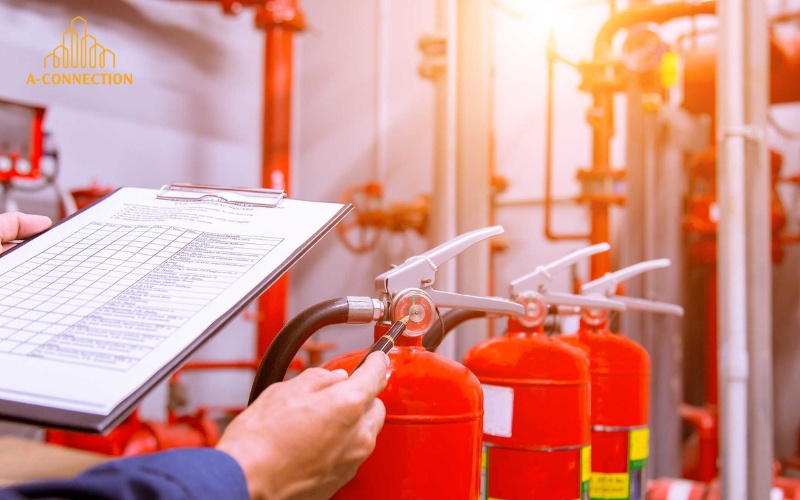Fire prevention and fighting (PCCC) is not only a social responsibility but also a mandatory legal obligation for all businesses. In 2025, several new fire safety regulations have been updated, directly affecting the operations of companies, factories, and business establishments. As a business owner, understanding the fire safety regulations for 2025 will help you avoid violations and protect both property and human lives.

1. Why Business Owners Must Comply with Fire Safety Regulations
1.1. Ensuring the Safety of Employees and Property
Fire and explosion incidents can cause billions in damage and seriously endanger workers’ health and lives. Therefore, proper compliance with fire safety regulations is the most practical protection measure.
1.2. Avoiding Administrative Penalties and Business Suspension
According to Decree 136/2020/NĐ-CP and the 2025 legal updates, businesses failing to comply may face:
-
- Fines ranging from 5 to 50 million VND depending on the violation
- Temporary or permanent suspension of business operations
- Criminal prosecution in cases of serious fire-related damages
2. Fire Safety Regulations Businesses Must Know in 2025
2.1. Is It Mandatory to Prepare a Fire Safety File?
Yes. Facilities on the list of high fire and explosion risks must prepare a fire safety management file, including:
-
- Fire safety location and layout diagrams
- List of fire safety equipment
- Records of periodic inspection and maintenance
- Fire safety training logbook
2.2. Required Fire Safety Equipment
Depending on the business type, facilities must be equipped with at least:
-
- CO₂ or dry powder fire extinguishers
- Automatic fire alarm system
- Emergency exit lights and instruction boards
- Fire hoses and water piping systems
- Automatic sprinkler systems for high-rise buildings and warehouses
2.3. Regular Fire Safety Training and Drills
According to new regulations:
-
- Fire safety training must be conducted at least once per year
- Dedicated fire safety staff must hold a valid fire training certificate
- Fire drills must be conducted, and the results reported to the fire police
2.4. Equipment Inspection and Maintenance
-
- Fire extinguishers must be recharged every 6–12 months
- Fire alarm systems must be tested quarterly
- Inspection records must be retained for at least 5 years for audit purposes

3. Legal Documents on Fire Safety Effective in 2025
To stay updated, business owners should refer to:
-
- Decree 136/2020/NĐ-CP
- Circular 149/2020/TT-BCA
- Official Dispatch No. 42/PCCC-2024 on updated lists of high-risk facilities
- A revised Decree is expected in 2025, currently under public consultation
4. Common Mistakes When Implementing Fire Safety Regulations
4.1. Purchasing Fire Equipment Just to Pass Inspections
Many businesses buy fire extinguishers but skip training or scheduled inspections, making the equipment unusable during emergencies.
4.2. Failing to Conduct Regular Training
Lack of basic firefighting skills is a key reason fires escalate. Regular employee training is mandatory.
4.3. Missing or Improper Documentation
Failure to retain proper documentation and records can cause problems during surprise inspections.
5. Tips for Preparing a Fire Safety File for Businesses
Essential Documents Include:
-
- Fire safety design approval documents (if applicable)
- System acceptance reports
- Purchase and inspection contracts for fire safety equipment
- Training logs and employee fire safety certificates
Work With a Professional Service
Hiring a reputable fire safety consultancy helps you complete your fire safety documents and legal procedures efficiently. This reduces risks of fines and saves time.
Fire safety is not about ticking boxes—it’s a vital element of sustainable business operations. In 2025, with many newly updated regulations, business owners must take an even more proactive approach to fire prevention and protection.
For expert legal and technical fire safety consulting, contact us via hotline 0968 68 8081 today.




